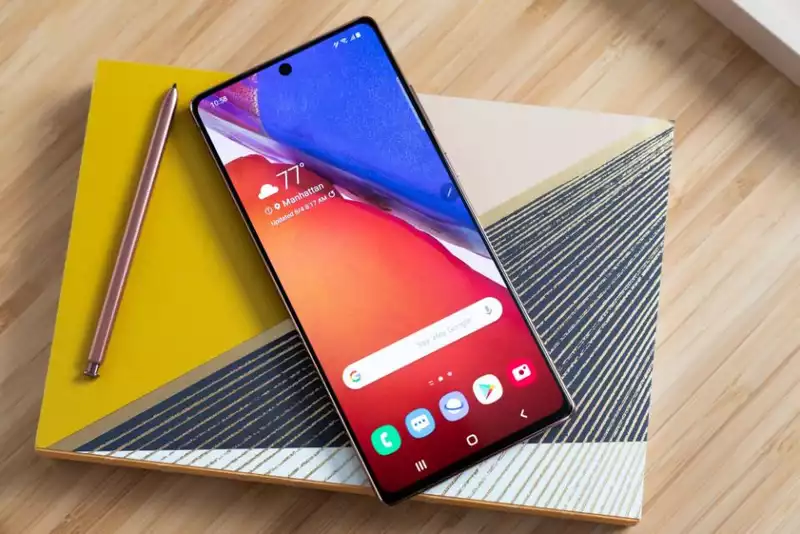If the Galaxy Note 21 will not be released this year, what future does the Samsung Galaxy Note series have? Originally a wildly different take on the smartphone, recent phones seem to have adopted almost every unique feature that cell phones once had.
Even the S Pen is no longer exclusive to the Galaxy Note; the Galaxy S21 Ultra is compatible with Samsung's stylus, and the company just confirmed at MWC that future flagship models will support the S Pen. Under these circumstances, what good is the Galaxy Note really going to do?
Here's how Samsung is reinventing the original phablet for a new era of mobile computing.
The Samsung Galaxy Note was launched in 2011, when most smartphones were fairly small devices. For comparison, the screen of the original Note was 5.3 inches; the Galaxy S2, released earlier the same year, was 4.7 inches. iPhone 4S screens were only 3.5 inches.
It was the Galaxy Note series that popularized the idea of the phablet, and as the years went by, cell phone screens grew larger. Today, the majority of flagship models have screens larger than 6 inches. The Notebook series also saw the launch of curved-edge displays. albeit not as frequently as just a few years ago.
The Note was also one of the few smartphones that continued to use a stylus after Apple popularized the idea of a touchscreen-only interface. As such, many of the Galaxy Note's features and software were built around the S Pen. Features include the ability to handwrite digital notes and draw in a more natural way than using one's fingers.
As the Galaxy Note series matured, the S Pen also included new features such as air gestures and Bluetooth shutter control.
But as the years went by, other Galaxy S series caught up to the Galaxy Note in terms of size and performance; the S Pen was always the only thing the Galaxy Note had going for it. But that will not be the case in the future.
Without the S Pen, the Galaxy Note series is currently unnecessary. Rather, Samsung has made its own Note devices obsolete, with the Galaxy S series catching up to the Note and the Galaxy S Ultra model essentially taking the Note's place in the company's portfolio. While it does not have a dedicated stylus slot like the Galaxy Note, it can use nearly the same pen-based features. As a good stylus should, the S Pen can be used for writing, drawing, and annotating, but that's about it.
More advanced features such as air gestures and Bluetooth shutter control are still exclusive to the Galaxy Note series. However, Samsung suggests that this could change in the near future.
But despite such slight differences, the Galaxy S21 Ultra remains a Galaxy Note in everything but name.
Obviously, these are not new points. The demise of the Galaxy Note series has been rumored for months. Long before Samsung confirmed that the S21 Ultra would indeed support the S Pen. And the fact that the foldable Galaxy Fold 3 appears to support the S Pen, along with rumors of a larger 7.7-inch internal display, means that the Note series is as good as dead in the water.
Rumor has it that the last Galaxy Note phone will be released later this year (or early next year) as a sort of "last gasp" for the Galaxy Note series. But instead of Samsung releasing the last generic phone and saying "that's it, goodbye," there is another way. In fact, this is an opportunity for Samsung to completely revamp the Galaxy Note and secure its place in the future.
There is no reason to keep the Galaxy Note as it is today. Instead, Samsung should focus on reinventing this lineup into something it does not yet have. Samsung has gradually positioned this phone as a "corporate device" over the past few years.
The Samsung Galaxy Note should be a dependable phone for business users. In the past, the BlackBerry filled that role, but these days the iPhone seems to have become the de facto "work phone."
There is no reason why Samsung should not try to make some of that territory their own. After all, Samsung has already tried it with previous Galaxy devices, even going so far as to develop software (DeX) that allows the phone to be used as a desktop machine when you are at your desk.
The Galaxy Note has already built nearly a decade of brand recognition and is naturally out of place in Samsung's portfolio. As such, this would be an excellent opportunity to do so.
With the Note in hand, Samsung can stop worrying about having to make a new one every year. Instead, it can focus on developing a phone built for business rather than for pleasure. [You don't necessarily need the latest and greatest chipset; you just need good enough hardware. Similarly, security could be emphasized, as it was in the heyday of Blackberry. Samsung could take data security to the next level in terms of protecting sensitive corporate data.
As for the S Pen. It's a feature and function that requires detailed input that cannot be mimicked by a finger or mouse. Taking notes, annotating, etc.
Another option is to kill off the brand and disappear into obscurity. That, frankly, would be a great waste.
.









Comments